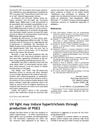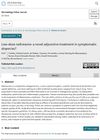February 2025 in “Prospects in Pharmaceutical Sciences” Clascoterone is a promising topical treatment for hair loss and acne with fewer side effects.
 December 2024 in “Tropical Journal of Natural Product Research”
December 2024 in “Tropical Journal of Natural Product Research” Parsley leaf fractions may help treat and prevent hair loss.
9 citations,
May 2002 in “PubMed” Retinoic acid affects skin and hair health by working with specific receptors, and its absence can lead to hair loss and skin changes.
 18 citations,
February 2018 in “International Journal of Molecular Sciences”
18 citations,
February 2018 in “International Journal of Molecular Sciences” PGD2 increases androgen receptor activity in hair cells, which could be targeted to treat hair loss.
 4 citations,
January 2002 in “Annals of Dermatology”
4 citations,
January 2002 in “Annals of Dermatology” Androgenetic alopecia, or hair loss, is most common in people in their 30s, can start early, is often inherited, and may be influenced by factors like hormones and scalp health.
 7 citations,
October 2006 in “Medical hypotheses”
7 citations,
October 2006 in “Medical hypotheses” UV light might cause excessive hair growth by increasing PGE2 in the skin.
 18 citations,
February 2012 in “Experimental Dermatology”
18 citations,
February 2012 in “Experimental Dermatology” No link found between specific genes and female pattern hair loss.
 January 2024 in “La Ciencia al Servicio de la Salud y Nutrición”
January 2024 in “La Ciencia al Servicio de la Salud y Nutrición” Spironolactone is effective and safe for treating hair loss, excessive hair growth, and acne.
April 2023 in “Journal of Investigative Dermatology” cp-asiAR may effectively treat hair loss by targeting androgen receptors.
 February 2023 in “Biophysical Journal”
February 2023 in “Biophysical Journal” Light can be used to stimulate ear hair cells, improving speed and consistency over previous methods.
 24 citations,
November 2019 in “Experimental Dermatology”
24 citations,
November 2019 in “Experimental Dermatology” PPAR-γ is important for healthy hair and its problems, and more research on PPAR-γ treatments is needed.
 51 citations,
January 1989 in “Journal of Investigative Dermatology”
51 citations,
January 1989 in “Journal of Investigative Dermatology” Men with male-pattern baldness have more androgen receptors in their scalp's oil glands, which may contribute to hair loss.
 March 2023 in “Biomedicine & Pharmacotherapy”
March 2023 in “Biomedicine & Pharmacotherapy” GPR40 agonists help hair growth through the protein ANGPTL4.
39 citations,
November 1978 in “Annals of internal medicine” Spironolactone may help reduce excessive hair growth in women with high male hormone levels.
 20 citations,
May 2016 in “Journal of Cosmetic Dermatology”
20 citations,
May 2016 in “Journal of Cosmetic Dermatology” Low vitamin D receptor levels found in hair loss patients; topical vitamin D treatment suggested.
 February 2016 in “The journal of investigative dermatology/Journal of investigative dermatology”
February 2016 in “The journal of investigative dermatology/Journal of investigative dermatology” JAK inhibitors may help treat alopecia areata by reversing hair loss.
 5 citations,
May 2020 in “Clinical and Experimental Dermatology”
5 citations,
May 2020 in “Clinical and Experimental Dermatology” Clascoterone may be a promising treatment for hair loss.
October 2022 in “Frontiers in Bioengineering and Biotechnology” Bioengineered nanoparticles can effectively treat hair loss by targeting specific enzymes and receptors.
 May 2013 in “Journal of the Egyptian Women's Dermatologic Society (Print)”
May 2013 in “Journal of the Egyptian Women's Dermatologic Society (Print)” High aldosterone and free testosterone levels link to female hair loss; testing aldosterone may predict hypertension risk.
 53 citations,
February 2020 in “Expert Opinion on Pharmacotherapy”
53 citations,
February 2020 in “Expert Opinion on Pharmacotherapy” Finasteride and minoxidil work best together for hair loss.
December 2002 in “대한피부과학회지” Higher androgen receptor levels in bald areas may cause hair loss, while estrogen receptors have less impact.
 February 2024 in “Scientific Reports”
February 2024 in “Scientific Reports” Cinnamic acid may help hair grow by activating oxytocin receptors.
November 2024 in “European Journal of Pharmacology” MitoQ may help treat hair loss by boosting hair growth pathways.
 2 citations,
April 2023 in “Pharmaceuticals”
2 citations,
April 2023 in “Pharmaceuticals” Scopolin and scopoletin from Merremia peltata leaves may help treat hair loss and showed promising results in rabbit tests.
 4 citations,
January 2019 in “Dermatology Online Journal”
4 citations,
January 2019 in “Dermatology Online Journal” Low-dose naltrexone might be a cheap and effective additional treatment for hair loss with scalp discomfort due to its anti-inflammatory effects and few side effects.
 49 citations,
January 1994 in “The Journal of Steroid Biochemistry and Molecular Biology”
49 citations,
January 1994 in “The Journal of Steroid Biochemistry and Molecular Biology” RU 58841 may treat acne, hair loss, and excessive hair growth.
 416 citations,
September 1997 in “Journal of Investigative Dermatology”
416 citations,
September 1997 in “Journal of Investigative Dermatology” People with hair loss have more androgen receptors and enzymes in certain follicles, with men and women showing different patterns.

Activin A increases inner ear hair cell development, while follistatin decreases it.
 5 citations,
December 1979 in “Clinical and Experimental Dermatology”
5 citations,
December 1979 in “Clinical and Experimental Dermatology” Anti-androgens are effective for female acne but less so for male-pattern hair loss, with side effects similar to birth control pills.
 2 citations,
January 2022 in “Skin Pharmacology and Physiology”
2 citations,
January 2022 in “Skin Pharmacology and Physiology” Dexamethasone increases the activity of androgen receptors in human skin cells, which may link it to certain types of hair loss.






















